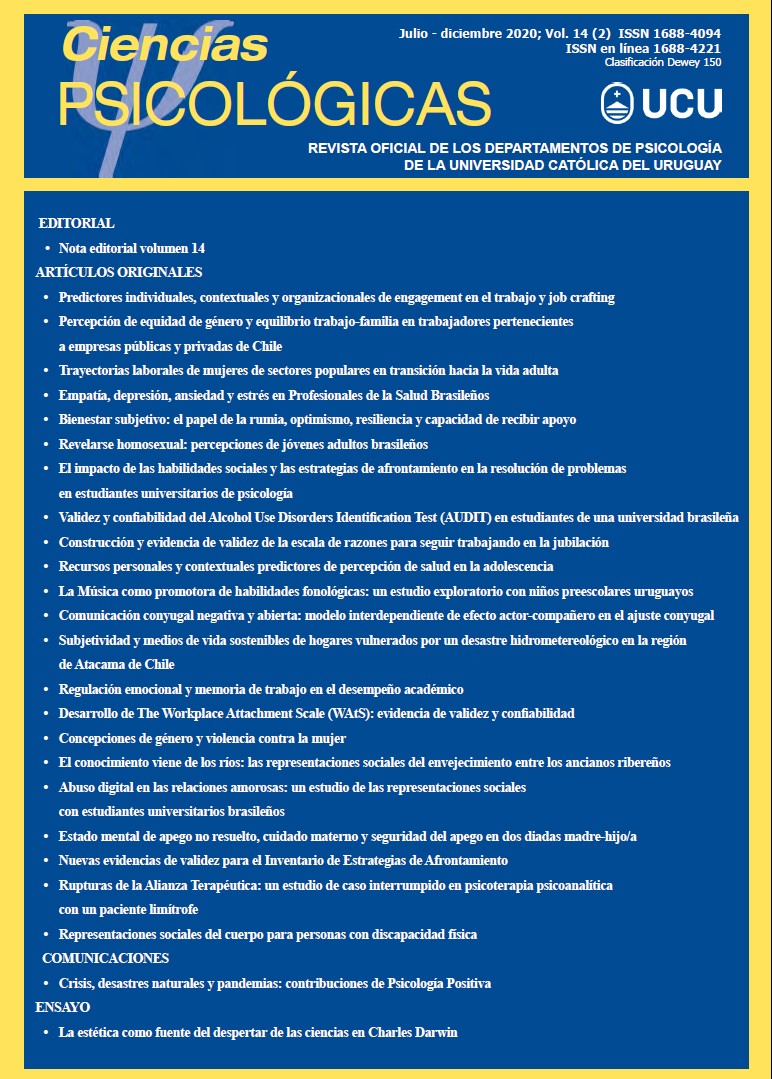Crises, natural disasters, and pandemics: insights from Positive Psychology
DOI:
https://doi.org/10.22235/cp.v14i2.2161Keywords:
Crisis Intervention, Positive Psychology, COVID 19, Mental HealthAbstract
In the wake of crises, pandemics, and natural disasters, several devastating consequences concerning the population’s mental health can be observed. For this reason, it is important to understand how psychology can help individuals and communities that experience a traumatic event. This paper will focus on insights from positive psychology in this context, given the topicality of the topic in the face of the global pandemic caused by COVID-19. The paper was organized to point out positive psychology applications, considering three phases: disaster preparedness, crisis response, and recovery phase. The literature review demonstrated that positive psychology could enable individuals to grow, even after experiencing a traumatic event, helping them reformulate their negative experiences, reflect on their priorities, and reassess their values.
Downloads
References
Ambrose, D. (2016). Twenty-first century contextual influences on the life trajectories of creative young people. Em: D. Ambrose & R.J. Sternberg (Eds.), Creative intelligence in the 21st century: grappling with enormous problems and huge opportunities (pp. 21-48). Netherlands: Sense Publishers.
Cherry, K. E., Sampson, L., Galea, S., Marks, L. D., Stanko, K. E., Nezat, P. F., Baudoin, K. H. (2018). Spirituality, humor and resilience after natural and technological disasters. Journal of Nursing Scholarship, 50(5), 492-501. doi: 10.1111/jnu.12400
Durgante, H., Mezejewski, L.W., Navarine e Sá, C., & Dell’Aglio, D. D. (2019). Intervenções psicológicas positivas para idosos no Brasil. Ciencias Psicológicas, 13(1), 106-118. doi: 10.22235/cp.v13i1.1813.
Faro, A., Bahiano, M. A., Nakano, T. C., Reis, C., Silva, B. F. P., Vitti, L. S. (2020). COVID-19 e saúde mental: a emergência do cuidado. Estudos de Psicologia (Campinas), 37, e200074. doi: 10.1590/1982-0275202037e200074
Fernández-Ríos, L. & Vázquez, M. V. (2018). Historia, investigación y discurso de la Psicología Positiva: Un abordaje crítico. Terapia psicológica, 36(2), 123-133. doi: 10.4067/S0718-48082018000200123
Gil-Rivas, V. & Kilmer, R. P. (2016). Building community capacity and fostering disaster resilience. Journal of Clinical Psychology, 72(12), 1318-1332. doi: 10.1002/jclp.22281
Gong, Y., Cheung, S., Wang, M., & Huang, J. (2012). Unfolding the proactive process of creativity: integration of the employee proactivity, information exchange, and psychological safety perspectives. Journal of Management, 38(5), 1611-1633. doi: 10.1177/0149206310380250.
Jacobs, G. A., Gray, B. L., Erickson, S. E., Gonzalez, E. D., & Quevillon, R. P. (2016). Disaster mental health and community-based psychological first aid: concepts and education/training. Journal of Clinical Psychology, 72(12), 1307-1317. doi: 10.1002/jclp.22316
Kaniasty, K. (2020). Social support, interpersonal, and community dynamics following disasters caused by natural hazards. Current Opinion on Psychology, 32, 105-109. doi: 10.1016/j.copsyc.2019.07.026
Liberto, A. K., Johnson, E. T., & Schulenberg, S. E. (2020). Responding to adolescents following natural and technological disasters: the essential nature of hope. Em: S. E. Schulenberg (Ed.), Positive Psychological approaches to disaster: meaning, resilience, and posttraumatic growth (pp. 115-136). Switzerland: Springer.
Lowe, S. R., McGrath, J. A., Young, M. N., Kwok, R. K., Engel, L. S., Galea, S., & Sandler, D. P. (2019). Cumulative disaster exposure and mental and physical health symptoms among a large sample of Gult Coast residents. Journal of Traumatic Stress, 32, 196-205. doi: 10.1002/jts.22392
Machado, F. A., Gurgel, L. G., & Reppold, C. T. (2017). Intervenções em Psicologia Positiva na reabilitação de adultos e idosos: revisão da literatura. Estudos de Psicologia (Campinas), 34(1), 119-130. doi: 10.1590/1982-02752017000100012
Morgado, A. M. (2018) After disaster: conceptualizing the extent and length of the psychological impact. BMC Health Services Research, 1472. Recuperado de http://nectar.northampton.ac.uk/10238.
Ornell, F., Schuch, J. B., Sordi, A. O., & Kessler, F. H. P. (2020). “Pandemic fear” and COVID-19: mental health burden and strategies. Brazilian Journal of Psychiatry, Epub April 03, 2020. doi: 10.1590/1516-4446-2020-0008
Paranhos, M. E. & Werlang, B. S. G. (2015). Psicologia nas Emergências: uma Nova Prática a Ser Discutida. Psicologia: Ciência e Profissão, 35(2), 557-571. doi: 10.1590/1982-370301202012
Park, C. L. (2016). Meaning making in the context of disasters. Journal of Clinical Psychology, 72(12), 1234-1246. doi: 10.1002/jclp.22270
Paton, D. (2019). Disaster risk reduction: Psychological perspectives in preparedness. Australian Journal of Psychology, 71, 327-341. doi: 10.1111/ajpy.12237.
Quevillon, R. P., Gray, B. L., Erickson, S. E., Gonzalez, E. D., & Jacobs, G. A. (2016). Helping the helpers: assisting staff and volunteer works before, during and after disaster relief operations. Journal of Clinical Psychology, 72(12), 1348-1363. doi: 10.1002/jclp.22336
Raley, M. J., Weber, M. C., Lemon, C. E., & Schulenberg, S. E. (2020). The disaster sciences interdisciplinary minor at the University of Mississipi: positive psychology in action. Em: S. Schulenberg (Ed.), Positive Psychological Approaches to Disaster (pp. 187-198). Singapura: Springer.
Rasulzada, F., & Dackert, I. (2009). Organizational Creativity and Innovation in Relation to Psychological Well-Being and Organizational Factors. Creativity Research Journal, 21, 191-198. doi: 10.1080/10400410902855283.
Robinson, S. J. (2018). How can psychology inform disaster research? Procedia Engineering, 212, 1083-1090. doi: 10.1016/j.proeng.2018.01.140
Runco, M. A. (2016). We must prepare for the unforeseeable future. Em: D. Ambrose & R. J. Sternberg (Eds.), Creative intelligence in the 21st century: grappling with enormous problems and huge opportunities (pp. 65-73). Netherlands: Sense Publishers.
Sattler D. N. & Smith A. (2020). Facilitating Posttraumatic Growth in the Wake of Natural Disasters: Considerations for Crisis Response. Em: S. Schulenberg (Ed.), Positive Psychological Approaches to Disaster (pp. 169-185). Singapura: Springer.
Shing, E. Z., Jayawickreme, E., & Waugh, C. E. (2016). Contextual Positive coping as a factor contributing to resilience after disasters. Journal of Clinical Psychology, 72(12), 1287-1306. doi: 10.1002/jclp.22327
Southwick, S. M., Satodiya, R., & Pietrzak, R. H. (2016). Disaster mental health and positive psychology: an afterward to the special issue. Journal of Clinical Psychology, 72(12), 1364-1368. doi: 10.1002/jclp.22418
Venberg, E. M., Hambrick, E. P., Cho, B., & Hendrickson, M. L. (2016). Positive psychology and disaster mental health: strategies for working with children and adolescents. Journal of Clinical Psychology, 72(12), 1333-1347. doi: 10.1002/jclp.22289
World Health Organization (2020). Coronavirus disease 2019 (COVID-19) situation report. Recuperado de https://www.who.int/docs/default-source/coronaviruse/situation-reports/20200407-sitrep-78-covid-19.pdf?sfvrsn=bc43e1b_2
Published
How to Cite
Issue
Section
License
Copyright (c) 2020 Universidad Católica del Uruguay

This work is licensed under a Creative Commons Attribution 4.0 International License.
















